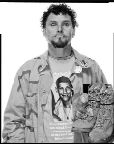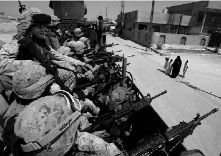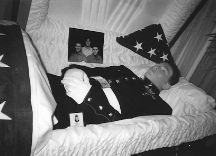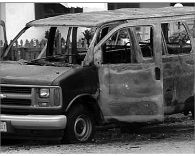Winter Soldier (25 page)
Authors: Iraq Veterans Against the War,Aaron Glantz
Tags: #QuarkXPress, #ebook, #epub

Just before midnight, Jeffrey asked me for the second time in ten days if he could sit on my lap and if I could rock him for a while, and we did. We sat there for about forty-five minutes and I was rocking Jeff, and we were in total silence. As his private therapist said, it was his last harbor and his last place of refuge.
The next day I came home. It was about 7:15. I held Jeff one last time as I lowered his body from the rafters and took the hose from around his neck.
• • •
As a result of our family’s experiences in May and June 2004, and our attempts to help him, we offer these few observations. First, why must the veteran meet the system’s needs? Was not the VA health-care system developed to meet the needs of our veterans?
We were promised that steps would be taken in a timely manner to assure there would not be another Jeffrey. But two-and-a-half years after our Jeff died, there was Jonathan Schulze of Stewart, Minnesota. He died on January 16, 2007, in the identical fashion of our son, being turned away from the VA..
What was the purpose of the March 2007 Washington Post Walter Reed exposé and the government’s immediate verbal reaction that they would address the issues? And then the CBS News investigation in November, reporting that the most up-to-date data indicated that an average of 120 veterans commit suicide each week? In the midst of all this, the Dole-Shalala Report was issued. People took note and we asked, “What has been done?” The Joshua Omvig bill has turned into law, but that is only the first item on a long list of necessary improvements for soldier and veteran health care.
Many say the words, “Honor and support our troops,” but very few mean them. All people do is talk. Even as we talk today, how many more of our beloved troops and veterans have put nooses around their necks or loaded bullets in their chambers, their eyes filled with tears as they seek refuge from their agonies?
This is not moral. This is not ethical. We ask: Where is the rage? We call upon you to help us right this terrible wrong. Our family is suing the VA and this government for failing our son. Though there will never be a memorial to our loved ones, let their names never fade from your hearts or your memories: Walter Padilla, T.J. Sweet, Jason Cooper, Philip Kent, and so many more. Jeffrey is not the only tragedy. We are not the only family. We stand proudly with Military Families Speak Out and Gold Star Families for Peace and especially with all of you today.

Lance Corporal, United States Marine Corps, Fire Team Leader
Deployments: January–September 2003; May–August 2004, Nassariya, Najaf
Hometown: Randolph, Massachusetts
Killed in Action: August 25, 2004, awarded Bronze Star with Combat V (20 years old)
This is my family. This is my dream.
I was born in Costa Rica. I came here as an illegal alien, and I did the best I could to take care of my family. It is the most beautiful thing that happened in my life. I call my sons my American dreams, and I thank God every minute for my experience with them, because they are my greatest teachers.
This is my son Alexander.

That was the moment the recruiters went to his high school to seduce him with $20,000 cash to sign up—so many thousands of dollars for him to go into the military at the age of seventeen. They only required one parent to sign the consent form for a minor to join the military. The other parent is left behind. That’s what happened to me.
I am not a sperm donor. This is my son, who I loved very much. They didn’t have the respect to ask me if it was okay for him to go. They expect that they can grab our sons and daughters from anywhere they want, no matter if they’re English or Spanish. They’re seducing our sons with so many fake promises.
My son never had the opportunities they promised when he joined. He didn’t get the cash and he didn’t go to school. The signing bonus they promised is not even enough to go college, unless you’re going to a community college. The liars! They didn’t tell him. My son is one more victim of this immoral, illegal war. It is affecting the whole world.
Alexander wrote many, many letters home. In these letters, he speaks for himself. In one he wrote, “Tonight we were in a car chase and we picked up a guy with a grenade. I watched the whole damn thing. It didn’t have to happen. I love you and miss you.”

This is Alexander during his final days in the battle with Mutqtada al-Sadr in the old city of Najaf. My son is being carried in this truck like a guinea pig. He is anyone’s target. This is outrageous, how they put our sons and daughters in this kind of situation.
One more letter from Alexander. “It looks like I am going to be stuck in Iraq forever. It sucks, it’s hot, it smells, and I’m quite miserable.” Alex’s letters start changing from proud and honorable to miserable.
In another letter, Alexander explained the circumstances in which he was living. He was hoping to come home and go back to school. There was his girlfriend, Sheila. He was hoping to take care of his family.
Alexander was killed on August 25, 2004, in the old city of Najaf, where the marines’ one-four battalion was cut off for four days in a four-story building. He was struck by a bullet in his left temple, which opened his head an inch and a half. Alexander was twenty years and twenty days old when he died. He spoke through his last few hours and told of the miserable life he was living there.
Many sons and daughters are coming back from war with broken bodies and broken minds. If my son were back home today, he probably would be in the VA system, in which case I’d be very concerned about our situation as well.
But my son took up his own path in life. He’s resting in peace.
This is something that happens every few hours to families across the nation. Five years of war in Iraq, with more than four thousand casualties.

I say thank God for this picture, because it teaches me a lot. It’s been helping me a lot as well. This is the cost of the war at home. My son, Lance Corporal Alexander Arredondo, is lying in an open casket. And I thank God for the opportunity, because not many families in Iraq or the United States have the precious moment to say one last thing to your son with an open casket. I shared this moment with many other families and my heart goes to every single one.
This is the casualty at home. This is what happened when they came to notify me about the death of my son. That day also was my birthday. When I saw them coming, I thought my son was back because I saw their uniforms. I asked them to leave my house after they delivered the news.
I asked them to leave for more than a half-hour, and their pity was deep. They told me to go and nap for a half-hour. They left. I locked myself in their Marine Corps van, covered myself with gasoline, and set myself and the van on fire. I ended up more than 20 percent burned, with second- and third-degree burns. Because of what happened that day I spent one week in the hospital. They charged me $43,710.00. I didn’t have the money. They put a lien on my house. A week later I buried my son in Boston. This was in Hollywood, Florida.

This is only one story of over four thousand families. They each go through the notification moments, when they come to tell you.
This is how I’m going around the country grieving my son. This is my pain. This is my loss. This is the First Amendment of the Constitution. They allow me to participate. As a father it’s an obligation to honor my son and this country, to do anything I can to end this war. We can do it.

Lance Corporal, United States Marine Corps, MOS, 1st Light Armored Reconnaissance Battalion, 1st Marine Division
Hometown: Escondido, California
Killed in Action: March 27, 2003 (20 years old)
I visited Iraq in December 2003 with a family delegation. Global Exchange, Code Pink, Veterans for Peace, and the Alaro Organization gave me beautiful support for going to Iraq, because we needed to find the place my son died. I needed to show the Iraqi families that ordinary American people do not support the occupation, and that like Iraqi people who have lost a member of their family, American people have also lost members of their family in the war.
